
Individuals of all kinds do their best to avoid even asking themselves the question “When should I file bankruptcy?”. Unfortunately, working professionals as well as business owners like yourself file for bankruptcy every day. Some wait too long to file and worsen their financial situations. Others file when they still have other options left. It is safe to say that determining the best time to file can be tricky. For this reason, read on and discover when should I file bankruptcy.
Non-Affordable Monthly Payments
One of the most common indicators that you should file bankruptcy is that your monthly payments are not affordable. Business owners in various industries deal with business lows. Sales drop, which means profits do as well. As much as such business owners wish that their monthly bills would drop at the same time, they do not. Therefore, they struggle to find the money to keep up with their bills. If you have cut down on all of your unnecessary monthly payments like cable and still cannot afford your bills, you should consider filing for bankruptcy.
Credit Card Reliance
Another answer to “When should I file bankruptcy?” is “when you begin relying on your credit cards”. Some business owners begin using their business credit cards for personal purchases when their situations worsen. This can lead to business bankruptcy. Others continue adding to their personal debt by buying products and services on their own credit cards. They often go so far that they attempt to pay off one of their credit cards with another that is also accumulating debt. Both decisions are poor ones. If you can only afford your essentials by charging them, look into filing for bankruptcy.
Risk Of Foreclosure
Many business owners also file for bankruptcy when they are at risk of foreclosure. Any individual would shudder at the idea of losing their home. Some grow so anxious that they begin filing before even considering their bankruptcy options. Speak to a financial advisor before choosing between Chapter 13 and Chapter 7. Most professionals advise business owners to choose Chapter 13. With this option, you gain the opportunity to keep your home. All you have to do is establish a plan for repaying the debt you owe. If you are at risk of losing your house, you need to file bankruptcy. You also need to learn how to claim bankruptcy and keep your house.
Debt Consolidation Struggles
Also, consider filing bankruptcy if you cannot consolidate your debts. Business owners struggling with their finances turn to advisors for debt consolidation assistance. When they succeed, the business owners combine all of their debts into just one account. Then, they only have one account to pay off. This is much easier to do than having to pay off multiple at one time. Advisors move on to help business owners manage their one account and pay off their debt. If you have given this a try to no avail, your advisor might recommend that you file bankruptcy.
Ineffective Credit Counseling
Some business owners who ask “When should I file bankruptcy?” try out credit counseling beforehand. If you want to file Chapter 7 bankruptcy, you are required to attend credit counseling for half of a year. After six months of counseling, you can legally file for bankruptcy. Even if you do not want to file Chapter 7 bankruptcy, you should try out credit counseling before filing. You could find out that you have other options. Then, you can avoid tarnishing your financial record. Private wealth management assists many professionals in improving their investment methods. They, then, earn better returns and can improve their financial states. Consider all of your options during counseling. Only file for bankruptcy when credit counseling is ineffective.
Business owners have a hard time determining when they should file for bankruptcy. If you cannot afford your monthly payments due to a decrease in take-home pay, you should consider filing. Consider filing if you begin relying solely on your credit card to purchase necessities as well. Business owners dealing with foreclosure threats need to take bankruptcy into consideration. Those who have tried to consolidate their debts into one account, but failed to do so may benefit from filing too. Finally, ineffective credit counseling poses as a sign that you need to file. Keep these indicators in mind to answer your question of “When should I file bankruptcy?”.
 Business First Family Business, Accounting, Finance, Investing, Marketing And Management
Business First Family Business, Accounting, Finance, Investing, Marketing And Management